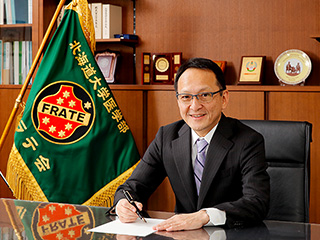
-
School of Medicine
-
Educational Content
-
Prospective Students
-
Current Students and Alumni
International Affairs

-
Graduate School of Medicine
-
Educational Content
-
Prospective Students
-
International Affairs

-
Graduate School of Biomedical Science and Engineering
-
Educational Content
-
Prospective Students
-
Other

-
Faculty of Medicine
-
Organizational Structure
-
Industry-academia Cooperative Projects

-
Overview
-
Entrance Examinations
-
Publications and Promotional Material
-
Various Types of Data
Greetings from the Dean
- HOME
- Graduate School of Medicine
- Greetings from the Dean
 Hokkaido University Graduate School of Medicine is the division to which graduate students belong. Its history dates back to 1955 when the Graduate School of Medicine at Hokkaido University was established. In 2017, Hokkaido University abolished the former graduate school system, which integrated both educational and research functions. Instead, two independent divisions have been established: the “graduate school” to which graduate students belong, and the “faculty” to which faculty members are affiliated. This is a global graduate education system that can organically respond to changing social conditions and students’ needs. At the graduate school, education is provided by faculty members from multiple research institutes and affiliated research centers within the University. This system allows for the smooth reallocation of educational resources and personnel without being restricted by departmental boundaries, enabling the establishment of a flexible educational framework.
Hokkaido University Graduate School of Medicine is the division to which graduate students belong. Its history dates back to 1955 when the Graduate School of Medicine at Hokkaido University was established. In 2017, Hokkaido University abolished the former graduate school system, which integrated both educational and research functions. Instead, two independent divisions have been established: the “graduate school” to which graduate students belong, and the “faculty” to which faculty members are affiliated. This is a global graduate education system that can organically respond to changing social conditions and students’ needs. At the graduate school, education is provided by faculty members from multiple research institutes and affiliated research centers within the University. This system allows for the smooth reallocation of educational resources and personnel without being restricted by departmental boundaries, enabling the establishment of a flexible educational framework.
The Graduate School of Medicine upholds the philosophy of “leading the world with cutting-edge research in medical science, and equipping the next generation of medical researchers and medical professionals with a strong sense of ethics and a well-rounded character to contribute to the health and welfare of humanity.” Its educational goal is “to help students develop advanced levels of knowledge and research skills in the fields of medical and life sciences and profound insights that meet the needs of society.”
The Doctoral Program involves one major and three courses, with a strong emphasis on providing education that transcends the boundaries of each specialized field, ensuring a well-rounded and highly specialized curriculum. The program specifically offers the following courses: the Basic Medicine Course, which trains future medical researchers and physician scientists; the Social Medicine Course, which cultivates professionals who will contribute to the fields of social medicine and public health administration; and the Clinical Medicine Course, which prepares individuals to conduct advanced clinical research.
As a unique initiative, the Graduate School introduced the MD-PhD Course in 2009 for students in the School of Medicine to foster basic medical researchers and educators who also have a medical license at an early stage. This course allows students in their sixth year to take doctoral program courses. Upon fulfilling the required credits and conditions, students can complete their graduate studies within three years after graduating from the medical school’s six-year program. The CLARC Program was also established in 2013. This program allows students to enroll in the graduate school during the second year of their initial clinical training. By combining clinical training with graduate-level courses offered in the evenings, the program enables early admission to the graduate school. It also allows for an overlap of clinical training and graduate studies for a certain period, making it an attractive option for clinical doctors aiming to become physician scientists.
The Master’s Program was established in 2002, ahead of other medical universities across the country. This program aims to promote the integration of knowledge from different disciplines by providing the latest medical and healthcare knowledge and information to individuals who have graduated from schools other than the School of Medicine. The objective is to cultivate researchers and highly specialized professionals with originality and a multifaceted perspective. In 2017, the Public Health Course was established, introducing an educational system that allows students to obtain a Master of Public Health (MPH) degree. This course offers a one-year program for individuals with practical experience in healthcare professions, such as physicians, dentists, and pharmacists. The accelerated program is designed to swiftly and effectively prepare professionals to address regional challenges unique to Hokkaido, such as the aging population and depopulation.
Students who pursue cutting-edge medical research at the Graduate School are expected to actively engage in the creation of novel knowledge and the resolution of various challenges with a strong sense of ethics, as members of an outstanding scientific community, while simultaneously responding to the needs of society. The Graduate School of Medicine at Hokkaido University has continuously developed the capabilities and systems necessary to fully meet the expectations of all enrolled students. We warmly welcome students with lofty ambitions who aspire to support the future of medicine and healthcare.
April 1, 2025
TANAKA Shinya, M.D., Ph.D.
Dean, Hokkaido University Graduate School of Medicine

